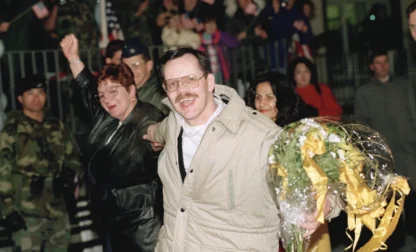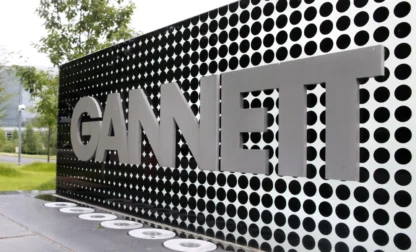WASHINGTON (AP) — Michael Shanahan, a veteran Washington political reporter for The Associated Press and Newhouse Newspapers who used that experience to teach new generations of students at George Washington University about the business he loved, died Saturday.
Frank Sesno, director of George Washington’s School of Media and Public Affairs, said Shanahan died Saturday morning, surrounded by family, after suffering a severe stroke earlier in the week.
“We are all devastated by this news,” Sesno said in a letter to students, faculty and staff. “Professor Shanahan was an unshakable friend and advocate of the School of Media and Public Affairs. He brought a reporter’s eye and a professor’s dedication to his work.”
Sesno said Sunday that Shanahan’s death was a surprise. “It was totally out of the blue,” he said.
Shanahan, 71, was assistant director for student affairs at SMPA. He also had taught various journalism courses at the school.
“There is nothing like being in a classroom and teaching and making some broader point … and suddenly a memory from my own experience as a journalist will pop into my head. I will tell a yarn, a story, an anecdote from my long experience as a reporter and that cements the broader theoretical point that I was making in the classroom,” he said in a video posted on his school website. “I can tell I’ve connected with the students when they say: ‘Aha! Now I understand what you mean.'”
For more than a quarter-century, Shanahan worked as a reporter, covering many areas of politics, from campaigns to federal agencies to Congress to the White House.
Shanahan joined the AP in 1965 after his graduation from Penn State. But after several months, he interrupted his journalism career for a stint in the military, including a tour as intelligence officer with service in the Vietnam War. He was awarded the Bronze Star.
He returned to journalism in 1969, working for the AP’s Pittsburgh bureau and covering such stories as the assassination of United Mine Workers leader Jock Jablonski and the 1970 fatal shooting of four students at Kent State University.
Soon after that, Shanahan moved to the Washington bureau of the AP. His coverage included presidential campaigns, top federal agencies, Congress and the White House. He covered the White House and politics at Newhouse Newspapers for six years after that. And for a decade he was a media spokesman for the American Petroleum Institute, before going into teaching.
Tom Raum, a longtime colleague at the AP, said Shanahan was a commuting partner, sailing companion and close friend. They would frequently cross paths on the campaign trail.
“He was low-key with a delightful sense of humor,” said Raum.
That wry sense of humor was in evidence during the early part of this decade, when a different Mike Shanahan was head coach of the Washington Redskins. Al May, a GWU colleague, said Shanahan would take calls from irate Washington Redskins fans and listen to their beefs. After letting them vent for a while, Shanahan would patiently tell them they had the wrong Shanahan, May said.
Shanahan brought the same enthusiasm he had for journalism to teaching and to advising students, said May, a GWU journalism professor who initially hired Shanahan at the school.
“He was an excellent professor,” May said. “He had an energy that comes with a second career, had an extraordinary commitment to teaching and to the kids, especially in passing along his experiences in Washington.”
Those experiences went far beyond Washington in a career that touched on many major events of the last half-century.
Shanahan returned to Vietnam early this year with his wife and toured many sites from the war that ended almost 40 years ago.
Among those was the town of An Loc, where Shanahan had served for seven months as an intelligence officer. With the help of a guide, he searched for familiar scenery.
“But there had been heavy combat in An Loc late in the war, including air strikes on part of the town, and everything from that era seemed gone,” he wrote in a story for The Boston Globe. “All the physical memories and symbols of my war had seemingly been bombed to smithereens.”
May said Shanahan had a session on Watergate scheduled for this coming week and talked in his lecture about actually covering the scandal. “His lecture showed the joy and enthusiasm he had for American journalism,” said May. “He really did convey that to the students.”
“I can remember so many times when students were troubled,” May said of Shanahan’s role as a student adviser. “Mike would never give up on them.”
Another GW colleague, Steve Roberts, said Shanahan “was a mentor, a counselor, a teacher and a friend to countless students at GW. His door and his heart were always open to them.”
Shanahan is survived by his wife, Victoria Elliott, and three grown daughters, Tina Spurlock and Martha and Claire Shanahan and four grandchildren.



